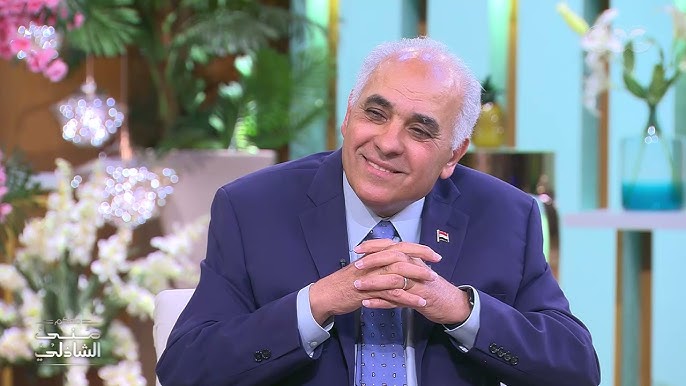International surgeon Dr. Kareem Abu El-Magd told Al-Ahram: I invented a surgery in my name to rehabilitate and stabilize the intestines, saving thousands from death.
Interview in the Egyptian Al-Ahram newspaper
The great gastrointestinal surgeon, Dr. Kareem Abu El-Magd, head of the Intestinal Surgery Center at the Cleveland Clinic in the United States, said that weight loss surgeries that are performed for cosmetic purposes and not for a medical reason expose patients to health risks, including gastrointestinal failure, which requires transplant operations, as Dr. pointed out. Abu El-Magd said during the “Al-Ahram” symposium that the change in dietary habits in Egypt and the Arab world in recent years, and excessive consumption of ready-made meals has caused damage to intestinal bacteria and the occurrence of chronic infections, which are diseases that we did not see in young people and children before.
Firstly, we would like to talk about the most important thing you did during your current visit to Egypt?
I have not stopped visiting Egypt, and with the exception of last year and the circumstances of the spread of the epidemic, I always visit every few months to examine patients, perform gastrointestinal surgeries for children and adults, and transfer expertise to young surgeons in the fields of intestinal transplantation and stabilization. With regard to modifying and stabilizing the intestine, it is one of the new surgeries that I invented and is used for cases that suffer from a change in the position of the intestine, a condition that affects one in every 500 children during the stages of fetal formation. Doctors often make mistakes in diagnosing it, causing patients to suffer from digestive complications and damage to the intestines and blood vessels. It also threatens the patient’s life. The surgery that bears my name depends on rearranging and stabilizing the intestines and digestive system organs, which is a delicate operation that is more difficult and longer than intestinal transplant surgeries.
Have you performed such difficult surgeries in Egypt?
Yes, the first operation I performed to modify and stabilize the intestines was performed on a Bangladeshi student in Kasr Al-Aini Medicine, and we were able to save her life. She had been suffering for years from chronic pain in the digestive system and she did not know its cause. Currently, I have established a charitable organization in Egypt to support the surgeries that I perform on children and adults. It is necessary to clarify that the success in intestinal modification and stabilization surgeries came due to the experiences gained from intestinal transplant surgeries, and that stabilization surgeries do not require giving patients immune system inhibitors. It is perhaps necessary to point out that the first case in the world of whole-viscera transplantation was carried out on May 2, 1990. The problem after the transplantation was the lack of medications that inhibit the body so that the body would accept the organs that had been transplanted. So a Japanese company manufactured a drug extracted from fungi that he took for life, and the transplantation operations continued. A lifeline for thousands of patients around the world after gastrointestinal failure.
How many intestine and viscera transplant surgeries have been performed globally?
About 3,500 transplant operations have been performed so far, and my surgical team and I have performed a third of these operations, whether for adults or children, and these cases have been saved from certain death. There are also rehabilitation and small intestine stabilization operations, which, as I mentioned, are more difficult than transplant surgeries because they require extreme precision and may take from 12 to 14 continuous hours.
What are the reasons that prompt a surgeon to perform an intestine or viscera transplant?
We make this decision in the event of complete failure of an organ in the digestive system or all organs. This may occur due to blockage of the blood vessels supplying the intestines and the occurrence of clots, or due to genetic factors that lead to hardening of the arteries supplying the intestines. It is possible for the patient to suffer from chronic inflammation of the intestines, which is known as Crohn’s disease. This disease It is closely related to the condition and quality of bacteria present in the intestines. Every person carries in his intestines the equivalent of half a kilogram of bacteria, which are affected and interact with the body according to the nature of the food that we eat. Therefore, eating a lot of healthy food, vegetables and fruits has a positive effect on the nature and secretions of bacteria, and vice versa in the case of eating fast food and trans fats. What we have noticed in recent years is the spread of chronic intestinal infections among children and young people in Egypt and Arab countries due to their excessive intake of unhealthy meals. It is also possible for liver cells to become cirrhotic due to Hepatitis C or many other causes of liver failure, which requires a liver transplant. It is also possible for the patient to develop tumors in the digestive system that require transplantation. There is also the possibility that accidents may cause clots in the blood vessels of the digestive system, which requires a transplant. Until this surgery is completed, many of these patients are fed with special solutions that are injected intravenously, and each case has its own composition of solutions. This specialty is still in its early stages in Egypt, and we need to train cadres and provide supporting technologies so that each patient is given the appropriate doses without harming him.
How can digestive system failure be avoided?
Health awareness must be increased through the media, schools, and universities about the importance of healthy nutrition, exercise, and maintaining weight, as the accumulation of fat around the abdominal area causes pressure on the digestive system, and examinations must be done periodically, especially for those over the age of fifty, to treat any defect in the digestive system before reaching the final stages, as well as Detecting digestive system problems in children and young people and training young cadres in Egypt on new medical and surgical paths.
In recent years, many types of surgeries have become widespread for slimming and overcoming obesity. Do these surgeries have an impact on the efficiency of the digestive system?
These surgeries should only be performed to treat a health problem and not for a cosmetic purpose, such as if the patient suffers from health complications such as high blood pressure, diabetes, or kidney problems, or his weight exceeds 300 kilograms, etc. These surgeries expose the patient to the possibility of failure of the digestive system in the long term, and if this possibility is weak, then it is a problem. A catastrophic event that threatens the patient's life. I have called in the United States for the importance of legalizing this type of surgery, in view of the cases that came to me suffering from failure of the digestive system after undergoing slimming operations that are currently widespread. I believe that obesity surgeries that are performed without a medical purpose are a crime against the patient, and according to current research, it is expected in the ten years. In the future, medicinal treatments will appear that dispense with them

 عربي
عربي
